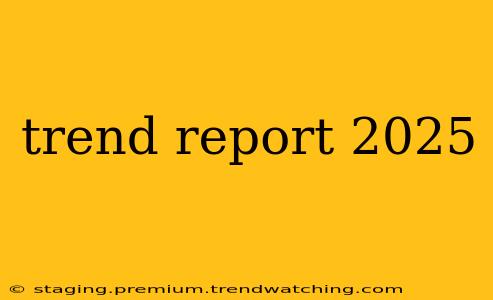The year is 2024, and looking ahead to 2025 requires more than just extrapolation; it necessitates a nuanced understanding of current shifts and emerging technologies. This trend report delves into key areas shaping our future, offering insights beyond the surface-level predictions. We'll explore the convergence of technology and human experience, the evolving landscape of work and leisure, and the growing emphasis on sustainability and ethical considerations.
Technology: Seamless Integration and Ethical Concerns
2025 will witness a further blurring of lines between the physical and digital worlds. Expect advancements in extended reality (XR) – encompassing virtual, augmented, and mixed realities – to significantly impact entertainment, education, and even healthcare. We'll see more sophisticated AI applications, moving beyond simple automation to personalized experiences and predictive analytics. This integration, however, raises crucial ethical questions.
How will AI impact our daily lives in 2025?
The integration of AI will be increasingly subtle yet pervasive. Think personalized recommendations that go beyond simple product suggestions, AI-powered healthcare diagnostics assisting doctors, and smart homes anticipating our needs proactively. However, concerns surrounding data privacy, algorithmic bias, and job displacement remain paramount. Addressing these challenges ethically will be crucial for a positive future.
What are the biggest technological breakthroughs expected in 2025?
While pinpointing specific breakthroughs is difficult, several areas show immense promise: advancements in quantum computing, breakthroughs in sustainable energy technologies (like improved battery technology and advanced solar panels), and further refinement of gene editing technologies for medical applications. These breakthroughs, however, will likely come with their own sets of ethical considerations and societal implications.
The Future of Work and Leisure: Blurred Lines and Flexible Models
The traditional 9-to-5 workday continues its decline. Remote work, flexible schedules, and the gig economy will further solidify their presence in 2025. This necessitates a reassessment of work-life balance and the need for adaptable work models that cater to diverse needs and lifestyles.
What will the future of work look like in 2025?
Expect a hybrid model to prevail. Some roles will remain primarily office-based, while others embrace fully remote setups. Many organizations will adopt flexible work arrangements, enabling employees to choose their working hours and locations, fostering improved productivity and employee well-being.
How will leisure activities evolve in 2025?
Experiential travel and personalized entertainment will take center stage. XR technologies will offer immersive and interactive leisure experiences, blurring the lines between the virtual and physical worlds. Sustainability and responsible tourism will gain more prominence, influencing travel choices and leisure activities.
Sustainability and Ethical Consumption: A Growing Emphasis
Environmental concerns will continue to drive significant change. Sustainable practices will become increasingly integrated into various sectors, from manufacturing and agriculture to energy production and consumption. Ethical consumerism will gain traction, with consumers demanding transparency and accountability from brands.
What role will sustainability play in shaping trends in 2025?
Sustainability will move beyond a mere trend and become a fundamental aspect of business operations and consumer choices. Companies that prioritize environmental and social responsibility will gain a competitive edge. Consumers will actively seek out eco-friendly products and services, influencing market demand and driving innovation in sustainable solutions.
How will ethical consumption impact businesses in 2025?
Businesses will need to demonstrate their commitment to ethical and sustainable practices to retain customers. Transparency and traceability will become essential aspects of supply chains. Those who fail to adapt to these evolving consumer demands will likely struggle to remain competitive.
Conclusion: Navigating the Uncertainties of 2025
2025 presents both opportunities and challenges. While technological advancements promise remarkable progress, careful consideration of their ethical implications is essential. The evolving landscape of work and leisure necessitates adaptable strategies and a renewed focus on work-life balance. Sustainability and ethical consumption will shape consumer behavior and business practices, demanding a shift toward responsible and sustainable development. Navigating these complexities successfully requires a proactive and adaptable approach, embracing innovation while prioritizing ethical considerations and long-term sustainability.

